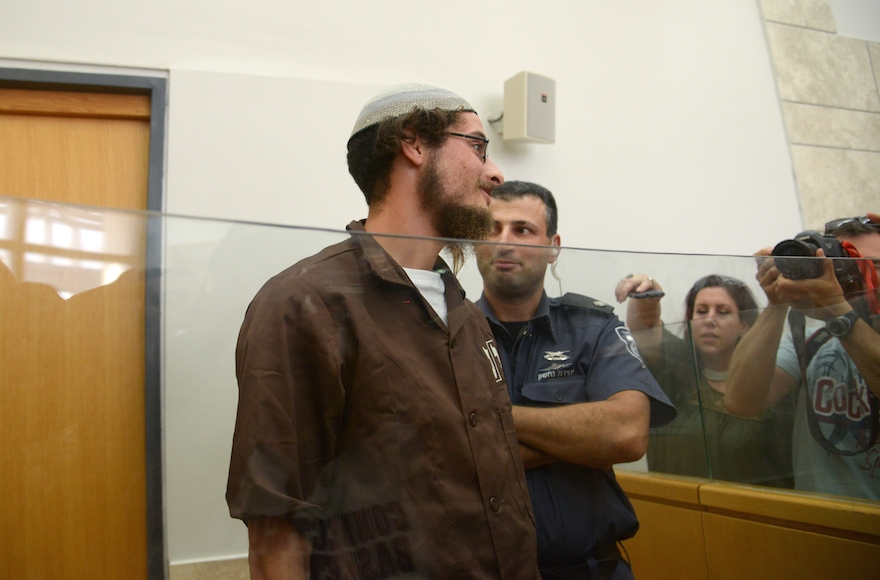(JTA) — The Jewish extremist Meir Ettinger was released from an Israeli prison after serving 10 months without charge on suspicion that he belonged to a terrorist group targeting Palestinians and Christians.
Ettinger, 24, grandson of the late ultranationalist politician Meir Kahane, was released Wednesday with restrictions, including a nighttime curfew, a six-month ban on entering the West Bank and Jerusalem, and on engaging in any sort of contact with 92 other far-right activists, Army Radio reported.
At the time of his arrest, police said Ettinger was the leader of a Jewish underground cell whose goal is to topple Israel’s democracy and carry out attacks against non-Jews. But he has not been charged with a crime.
His arrest followed several attacks on Palestinians and non-Jews in Israel and the West Bank, including the torching of The Church of the Multiplication of the Loaves and Fishes at Tabgha in Israel’s North and the torching of a Palestinian home in Duma. Three people, including a baby, perished as a result of the fire. Three defendants, two men and a minor, are standing trial for that incident. Ettinger, who has spoken openly about turning Israel into a theocracy, has not been named a suspect.
Ettinger, who was being held in solitary confinement and had staged a 17-day hunger strike to protest his detention, was arrested in August for “involvement in violent activities and terrorist attacks that occurred recently, and his role as part of a Jewish terrorist group,” according to Israeli authorities. During an arraignment in September, he told the Central District Court: “In the so-called Jewish state, there is a democratic right to anyone’s idea, perversion or fad, yet only Judaism itself is illegal.” He has denied any wrongdoing and charged his arrest was aimed at stopping him from spreading his ideas.
He published a manifesto last year titled “Those who follow G-d, come to me” in which he wrote that “the structures of the state and its ability to govern need to be toppled and replaced by a new establishment, and to to do that we need to operate outside the rules of the establishment we want to topple.”
Ettinger was held without charges or trial is a state known as administrative detention — a measure typically used against Palestinian terror suspects. A judge may place a suspect in administrative detention for a period of up to six months per term; the detention may be extended.
Israel’s Supreme Court has sanctioned administrative detention under certain limitations, ruling it conforms to international law and the Fourth Geneva Convention.
Israel says the measure is necessary for security, but civil liberty groups say the practice is a violation of human rights. There are a few hundred Palestinians and several Israelis held in administrative detention, according to the Israel Prison Service.
JTA has documented Jewish history in real-time for over a century. Keep our journalism strong by joining us in supporting independent, award-winning reporting.






